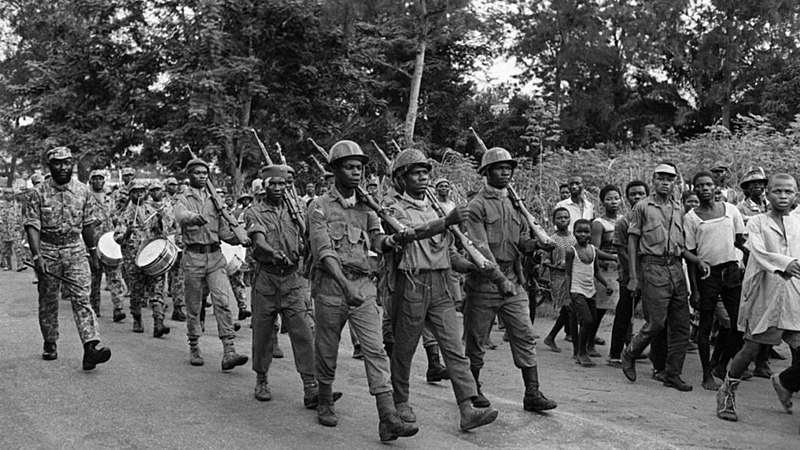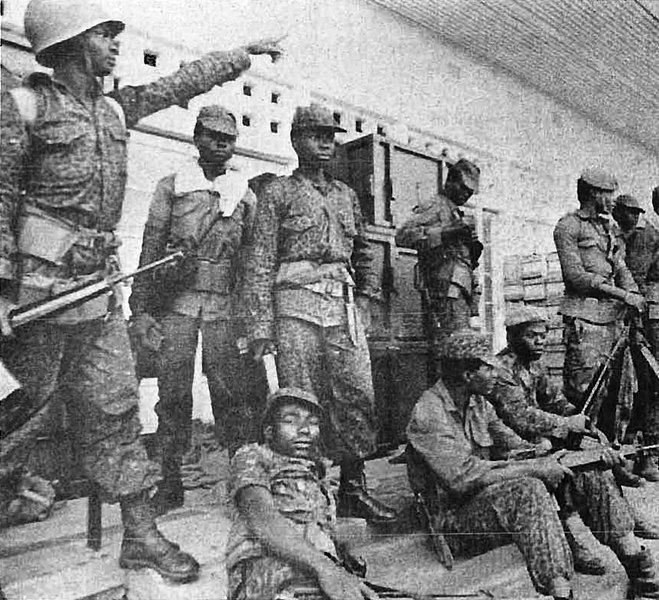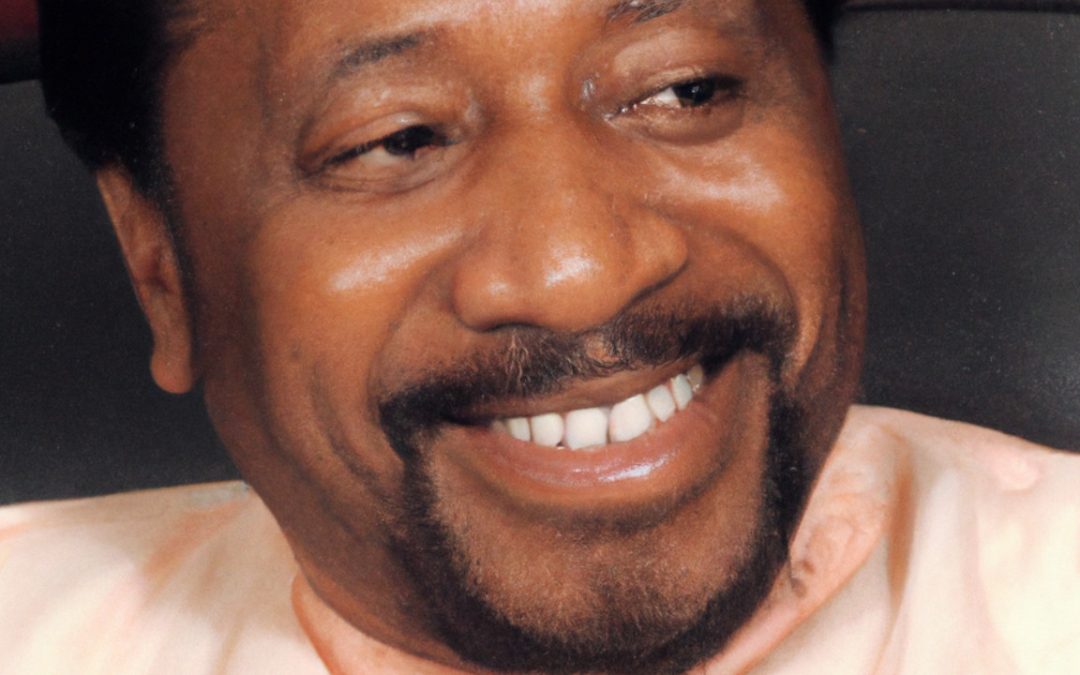Sani Abacha is notorious as the kleptocrat strongman who stole billions of dollars from Nigeria during his time in office. In power for just 5 years, so much about him remains mysterious. Much of his billions seemed to disappear in the wake of his downfall and still now authorities are attempting to hunt it down. But perhaps the greatest mystery was his untimely death. Dying at the age of just 54, while still in power, many believe he was murdered. These mysteries are just one factor that makes Sani Abacha an interesting case study of an African dictators.
The Wealth of Nations
Sani Abacha’s road to power is not unique, rising through the military over time and overthrowing the government by force. It’s a path many other African dictators have taken. First becoming an officer in the Nigerian army in 1963, he had a talent for violence and motivating men. Nigeria was in political chaos during this time period, with corruption and ethnic conflict a plague on the young nation. The country had around 300 ethnic groups of varying size – not all of which were certain they wanted to even be part of Nigeria to begin with. In 1967 a full blown civil war broke out. A southern region of Nigeria known as Biafra declared it’s independence and attempted to secede from Nigeria.
But since Biafra was large and on the coast, the Nigerian government refused to accept this. One year before Biafra declared it’s independence, there had been two military coups that overthrew first the legitimate government, and then the first military junta. Interestingly Sani Abacha actually played a role in the second coup of 1966, though not a senior officer at this time. Still, the new regime was brutal and willing to do almost anything to maintain power. So inevitably they saw the Biafra situation as an opportunity to do what they do best, mobilizing the military. What resulted was a brutal two and a half year war that saw both sides devastated.
Ending A War
The Nigerian side was better equipped and more well manned, but the Biafra rebels were happy to fight in miserable conditions as by this point they hated the government. In order to avoid this the government adopted a policy of isolating the Biafra forces until they had no choice but surrender. A big part of this strategy was blockading the region and starving the population into submission. It did work but at a terrible cost, with between 500 thousand and 2 million civilians dying of starvation. On top of the isolation, the Nigerian government was supported by both the Soviets and the British. With all things considered it was hard to see how the Biafra rebels had any hope of victory. Tens of thousands died, millions were displaces, and a whole lot of money lost for Nigeria during the war.

The cost of war also further destabilised the nation and only made the political climate darker. It was during the Nigerian civil war that Sani Abacha first rose to prominence, impressing his superiors while commanding a battalion. Through the 1970s and 80s he continued to rise in power, becoming one of the most respected and high ranking army officials in Nigeria. In 1983 he played a deciding role in yet another military coup, bringing general Muhammadu Buhari to power. His premiership did not last long, as in 1985 he was overthrown by another coup. With another general assuming leadership of Nigeria, Abacha was appointed to his first true political position, becoming chief of army staff. In 1990 he rose in power by another position.
The Wealth of Nigeria
After helping to defend the president against another military coup, Abacha was made minister of defence. Minister of defence is a prestigious position in any country, but considering how Nigeria was ruled by the military at the time, no other post could have been a better springboard for ambition.
Finally in 1993 Sani Abacha orchestrated his own coup d’etat. Through this time period elections were actually held, but with little impact on actual political mechanics as corruption and blatant dictatorial ministers engineered the outcome to suit their own purpose. But in the 1993 presidential election somebody made a mistake, and a rival seemed to be ahead of the dictator in the closing polls. This was a big problem, but still the military simply declared the result void and ignored it. The military junta was contempt to keep on going – but the backlash was so great that the president actually willingly resigned and has led a quiet life ever since. In his place was formed an interim government by a new president. Leading that interim government was of course a general, who like those before him believed his military authority entitled him to rule.
Unfortunately for him Sani Abacha thought the same thing, and had more support in the military. So he just forced the interim leader to resign – ostensibly of his own free will. Now in the top position after so many years of building his portfolio, Abacha took things further than the dictators before him. In 1994 he announced that his government was not subordinate to any court. This basically meant he was above the law and no one could do anything about it.
Start of Repression
Ruling more in the fashion of a medieval king than a modern president, issuing decrees at will and using the military to enforce them. On gaining power he promised the country that he would prioritise economic growth and even restore Nigeria to a democracy. But in his first decree he banned all political parties and organizations. Local government administrators across the nation were fired and replaced by military personnel. All political gatherings and events were outlawed on fear of treason charges. Abacha had countless political activists arrested and sent to prison. But amazingly, the economy did growth stronger under his rule. Nigeria’s national debt too was reduced, and ordinary people could see how the financial situation was improving. Nigeria’s national foreign currency reserves increased under his rule from just 494 million US dollars to 9.6 billion. But people could also see how the political situation was growing more autocratic.

The economic growth, however, was enough to keep him in power. Taking this success as an excuse to enrich himself, Sani Abacha funnelled massive amounts of money to himself and his family through means of corruption. Taking bribes and stealing tax payer money, it’s unclear how much the Abacha family actually gained during this period. Most estimates put the number between 1 and 5 billion US dollars worth. Only after his death would the scale of his blatant corruption and greed be exposed.
In 1998 Abacha died while still serving as the president of Nigeria, at the age of just 54. Given the nature of his regime, many assumed he had been assassinated by political rivals. This suspicion was heightened when he was buried that same day with no autopsy carried out. Official sources blamed his sudden and unexpected death on a heart attack.
Sani Abacha’s Legacy
But many claimed he was poisoned, perhaps by political rivals or even foreign enemies of Nigeria. US intelligence openly speculated that he was murdered. Still today no one knows what happened in the days leading up to the mysterious death of Sani Abacha, or if he was murdered. But in the decades since, a lot of information on his illicit wealth has come out. Using the international banking system against itself, he hid hundreds of millions in offshore accounts. From Switzerland to Jersey, to countless other places, an fortune large enough to last a century was hidden away for him and his family. No one knows how much of that fortune his family was able to extract after his death but the Abacha clan still appear to be extremely wealthy today.
Efforts to track down and recover his stolen loot has been somewhat successful. More than a hundred secret bank accounts were found, which were used to hide billions in Europe. In Switzerland alone, more than 400 million dollars was found. Researchers claim Abacha stole 2 billion dollars directly from Nigeria’s central bank in a brazen example of kleptocracy. Investigations continue and it may well be the case that many millions more will be found in coming decades. One year after his death Nigeria underwent a peaceful transition to a civilian government, and has been a democracy ever since. While not perfect, the political system is a world apart from the military dictatorship it experienced in times gone by. Perhaps with a little luck Sani Abacha will be the last dictator to reign as a stain on modern Nigerian history.

